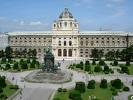Edward E Hitschmann 1871 - 1957
January 05, 2009
 Edward
E Hitschmann
1871 - 1957 was an Austrian Jewish physician who fled Nazi Germany in
1938 to find refuge in America.
Edward
E Hitschmann
1871 - 1957 was an Austrian Jewish physician who fled Nazi Germany in
1938 to find refuge in America.
Edward E Hitschmann’s grandfather was a homeopath.
Edward E Hitschmann was a colleague of Paul Federn, Arne Naess, Wilhelm Reich and Sigmund Freud, and the Director of Freud’s Psychoanalytic Polyclinic in Vienna in the 1920s:
Edward Hitschmann was born and educated in Vienna, where he was a practicing internist. Joining Freud’s Wednesday night Society in 1905, he briefly became the Freud family physician. Hitschmann was a devoted adherent of Sigmund Freud.
A pioneer psychoanalyst, he wrote Freud’s Theories of Neurosis (1911) for the education of the public about psychoanalysis. Hitschmann directed the Ambulatorium, Vienna’s outpatient low cost or free psychoanalytic clinic from 1922. Fleeing the Nazis, he immigrated to the USA in 1938.
His training in medicine was unusually thorough and engaged him in rotating residencies at the famous Allgemeine Krankenhaus for eight years. He emerged from it as a brilliant clinician and outstanding diagnostician.
But his life interest became psychoanalysis. In 1905 he joined the little group which gathered every Wednesday at Sigmund Freud’s house and out of which the psychoanalytic movement grew…
[Austrian physician and psychoanalyst Eduard Hitschmann was born in Vienna on July 28, 1871, and died in the United States on July 31,
- He was one](http://www.enotes.com/psychoanalysis-encyclopedia/hitschmann-eduard) of Sigmund Freud’s early disciples and remained loyal to him throughout a long career.
Raised in Vienna, Hitschmann was the son of a banker and the grandson of a homeopathic physician. He attended the University of Vienna Medical School, received his degree in 1895, and initially practiced internal medicine.
In 1905 Paul Federn brought him into the Wednesday Psychological Society. By then a well known physician, he served for a time as the Sigmund Freud’s family doctor.
In April 1909, Hitschmann read before the Vienna Psychoanalytic Society a paper entitled A General Presentation of Freud’s Theories (Nunberg and Federn, 1962) in which he proposed to write a brief exegesis of psychoanalytic ideas.
Sigmund Freud cautioned Hitschmann not to present psychoanalysis as a closed system and insisted on openly acknowledging that there are domains in which psychoanalysis could lay no clear claim to knowledge.
“Furthermore, this work would require that the writer refrain from expressing any of his own ideas” (Nunberg and Federn, 1962, p. 210).
Hitschmann went on to write the first concise presentation of psychoanalysis, Sigmund Freud’s Neuosenlehre: Nach ihrem gegenwärtigen Stande zusammenfassend dargestellt (1911), which was translated into English as Sigmund Freud’s Theories of Neurosis.
He also wrote numerous biographical studies, including those of Franz Schubert, William James, and Emanuel Swedenborg; these studies were published in Great Men: Psychoanalytic Studies (1956).
Hitschmann’s many psychoanalytic publications did not always receive a friendly appraisal by Sigmund Freud, who maintained a certain intellectual distance in spite of their friendship. He viewed Hitschmann as “quite orthodox” (Sigmund Freud 1974, p. 400), as he remarked to Carl Gustav Jung.
However, Sigmund Freud entrusted Hitchsmann to direct the psychoanalytic outpatient clinic, or “Ambulatorium,” when it was established in Vienna in 1922. Hitschmann fled the Nazis in 1938 and sought refuge in London; in 1944 he emigrated to Boston where he worked as a training analyst until his death.
August Karl Gustav Bier was so versatile as a doctor that he did not dwell solely on surgical problems and he became extremely interested in homeopathy and he demanded that regular medicine became more open to it, in which view he was supported by Erwin Liek, Ernst Ferdinand Sauerbruch, Kapferer and Mummert, and also Edward Hitschmann, whose grandfather was a homeopath, and Heinrich Meng who became the Chief Physician of the Robert Bosch Hospital in Stuttgart, which was itself founded by a homeopath and now houses a Homeopathic Archive.